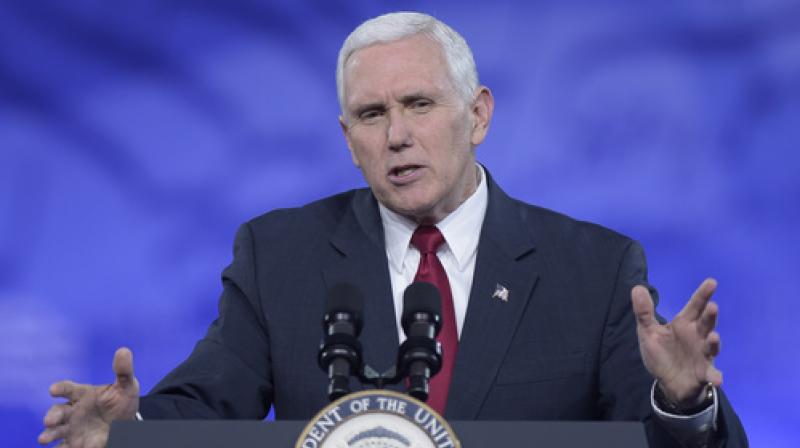Mike Pence says US stands by ally Japan on North Korea problem
Pence struck a stern tone as he began talks with Abe and other Japanese leaders after arriving at a U.S. naval base from South Korea.

Tokyo: US Vice President Mike Pence assured Japanese Prime Minister Shinzo Abe on Tuesday that the United States stands "100 percent" behind its anchor ally in Asia in working to defuse risks from North Korea's nuclear program.
Pence struck a stern tone as he began talks with Abe and other Japanese leaders after arriving at a US naval base from South Korea.
"We appreciate the challenging times in which the people of Japan live with increasing provocations from across the Sea of Japan," Pence said. "We are with you 100 percent."
The Trump administration has signaled a more forceful US stance toward North Korea's recent missile tests and threats, including a warning from Trump that North Korean leader Kim Jong Un has "gotta behave."
On Monday, Pence traveled to the tense Demilitarized Zone dividing North and South Korea, where he warned North Korea's leaders that after years of testing the US and South Korea with its nuclear ambitions, "the era of strategic patience is over."
A senior North Korean official then accused the United States of bringing the countries to the brink of thermonuclear war.
At the outset of his meeting with Abe, Pence said that "While all options are on the table," Trump was determined to work with Japan, South Korea and other allies in the region to resolve the problem.
Pence, on a 10-day Asia trip that will also take him to Indonesia and Australia, said Trump hopes China will use its leverage to get its longtime ally North Korea to abandon its nuclear weapons program.
But the vice president expressed impatience with the unwillingness of the North to move toward ridding itself of nuclear weapons and ballistic missiles. In Beijing, Chinese Foreign Minister Wang Yi made a new appeal Tuesday for calm on the Korean Peninsula.
Wang told reporters that although US officials have made clear that a military strike remains on the table, he believes that Washington would still prefer to de-escalate tensions through multi-sided talks.
Abe said Japan likewise hopes for peaceful dialogue with Pyongyang, "but at the same time, dialogue for the sake of dialogue is valueless." Pressure on North Korea is crucial, the prime minister said.
After meeting with Abe, Pence held talks with Japanese Deputy Prime Minister Taro Aso on a new U.S.-Japan "economic dialogue" to be led by the two.
The new forum for trade talks was launched by Trump and Abe during the Japanese leader's visit to the U.S. in February. In part, it is meant to take the place of the Trans-Pacific Partnership, the regional trade pact that Trump withdrew from shortly after taking office.
While Japan's trade surplus with the US is much smaller than China's, Trump has decried the imbalance, especially in auto exports.
Pence's advisers told reporters that he hopes to win better U.S. access to Japanese markets and to attract more Japanese investment in the US
Both sides said they do not expect the talks in Tokyo this week to delve into sector-by-sector talks on trade. With no U.S. trade representative yet in office and other key negotiator positions still unfilled, such nitty-gritty discussions will have to come later.
But the meetings could indicate how forcefully the U.S. will pressure Japan to further open its farm and automotive sectors.
The loss of U.S. participation in the Trans-Pacific Partnership was a blow to Japan following strenuous negotiations, especially over opening its long-protected farm sector to more imports, especially of dairy and meat products.
Japanese Chief Cabinet Secretary Yoshihide Suga told reporters over the weekend that Japan might push ahead with a revised, 11-nation version of the TPP despite the U.S. rejection of the trade accord.
For now, both sides seem eager to downplay potential for conflict. "My understanding is that our talks are premised not on friction but on cooperation," Aso told reporters before Pence's arrival.
As Indiana governor, Pence saw firsthand the impact of Japanese automakers Toyota, Honda and Subaru, whose factories employ thousands of people in his home state.
US Commerce Secretary Wilbur Ross, who met with Japan's trade minister, Hiroshige Seko, earlier Tuesday, said he hopes to soon begin talks on a free trade agreement with Japan.

